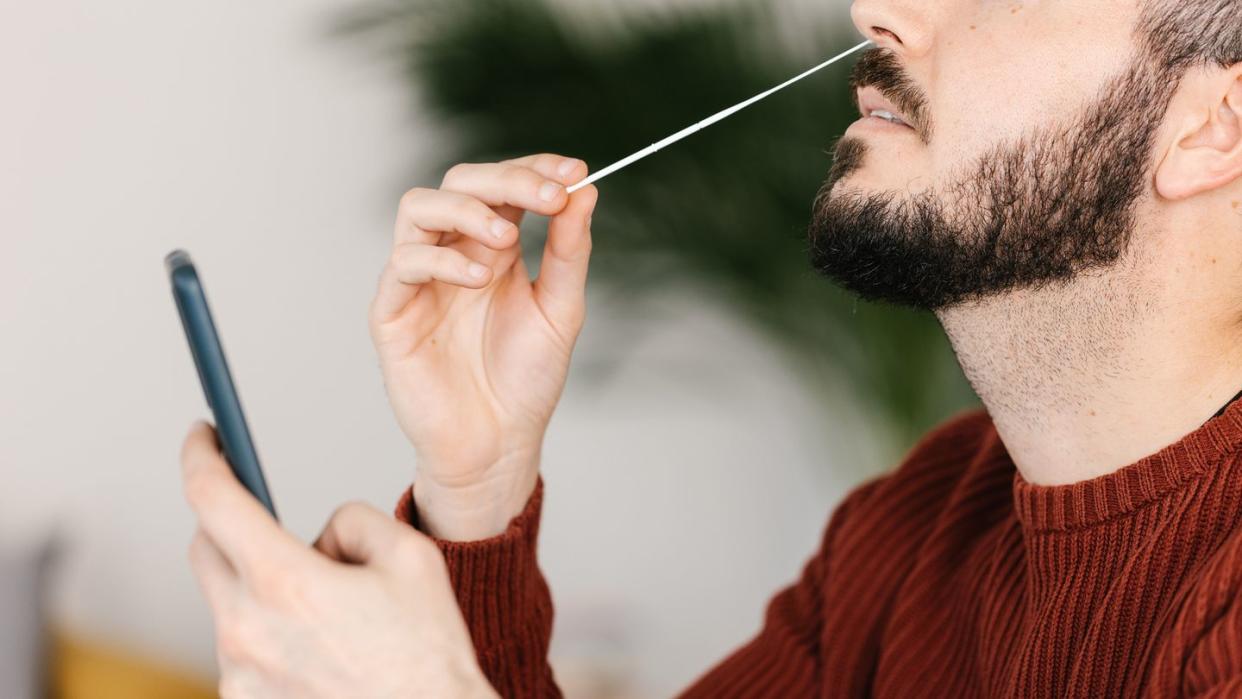Are False Positive Covid Tests Common? Doctors Explain.

"Hearst Magazines and Yahoo may earn commission or revenue on some items through these links."
TAKING A COVID-19 TEST is probably your first instinct when you wake up with a fever or sore throat or learn that the friend you just hung out with has cold- or flu-like symptoms. And, it’s a good idea with several new Covid variants floating around this fall.
Most likely, you have a few at-home Covid tests lying around. After you swab inside your nose and get a positive result, you may wonder how accurate it is, especially if you have mild symptoms or no symptoms at all.
False positives refer to test results indicating that you’re infected with Covid, even though you’re not really, or showing that you have Covid antibodies when you don’t, according to MIT Medical.
A false positive Covid-19 test result can happen, but it’s rare, says Brian Labus, Ph.D., M.P.H., assistant professor at the University of Nevada Las Vegas School of Public Health.
“Rapid tests work by detecting the Covid viral proteins, and sometimes they can accidentally identify a similar protein that isn't Covid, giving a false positive result,” explains. “The rapid tests have a sensitivity of over 99 percent, which means that false positive results will happen less than 1 percent of the time.”
On the other hand, false-negative results are much more common, and a bigger concern, Labus says. Testing negative when you really have Covid could increase the likelihood that you spread the virus to others unknowingly.
So, how can you know if your positive test is accurate? Experts explain when you actually need to test for Covid, why a false positive might happen, and what to do if you test positive.
When to Take a Covid Test
There are two instances when you should get tested for Covid, according to the Centers for Disease Control and Prevention (CDC).
Test immediately if you have Covid symptoms, like fever, cough, sore throat, body aches, or shortness of breath.
You also need to test at least five days after you were exposed to someone who has Covid-19.
In both instances, if you test negative via an at-home antigen test, you should repeat the test in 48 hours. If that test is also negative, the CDC suggests testing once again in another 48 hours.
Which Covid Test Should You Take
Covid tests use specimens from your nose or mouth to detect whether you’re infected with SARS-CoV-2, the virus that causes Covid-19, according to the CDC. The main types of tests include antigen tests and polymerase chain reaction (PCR) tests.
Most at-home tests or self-tests are antigen tests. They’re the ones that produce results within about 15 to 30 minutes. The CDC says positive results are usually pretty accurate—but the tests are less likely to detect the virus when you don’t have symptoms.
So, it’s a good idea to test again if your antigen test is negative or confirm the results with a PCR test.
PCR tests are more likely to detect the virus than antigen tests. They’re usually done by a healthcare provider, and it can take a few days to get your results.
Why You Might Get a False Positive?
Although false positive results are rare, they can still happen, says Henry Redel, M.D., chief of infectious disease at Saint Peter’s University Hospital in New Brunswick, New Jersey.
“The false positive tests can arise due to contamination, not following instructions, or misinterpreting the results,” he says.
When you test, such as testing if you have symptoms or if you don't, may affect the results, too. Antigen tests tend to be more accurate when you have symptoms.
Also, check the expiration date on your at-home tests. Expired tests may produce a false result. However, the Food and Drug Administration has extended the expiration dates for some tests. You can check yours here.
If you're worried that your positive test might be a false positive, get it confirmed with a PCR test, Dr. Redel says.
How Common Are False Positives?
Positive results from at-home Covid tests are usually accurate, says Vincent Covelli, M.D., a board-certified infectious disease physician with PlushCare.
“False positives are more commonly seen with PCR tests because of the test’s ability to detect dead virus particles weeks after the initial infection,” he says. “If someone still tests positive after a month, they likely no longer have the virus.”
Research published in 2021 showed that antigen tests are more likely to be accurate when someone has a high virtual load or shows symptoms. A 2022 research letter published in JAMA Network showed that of more than 903,000 rapid antigen tests, 462, or 0.05%, were false positive.
What to Do When You Test Positive for Covid
If you test positive for Covid, you most likely have the virus, even if you don’t have symptoms. The positive result means the virus was detected.
This is what you should do if you test positive, according to the CDC:
Stay home and isolate yourself
Wear a mask to protect others from getting infected
Contact anyone you were recently in contact with
Keep an eye on your symptoms, and seek emergency care if you have trouble breathing
Call your doctor about potential treatments
If you're not positive for Covid, then be sure to help protect yourself from getting it by getting vaccinated and staying up-to-date on your boosters, Dr. Covelli says.
“The earlier you get your vaccinations, the more time your body has to build up immunity,” he says.
You Might Also Like

